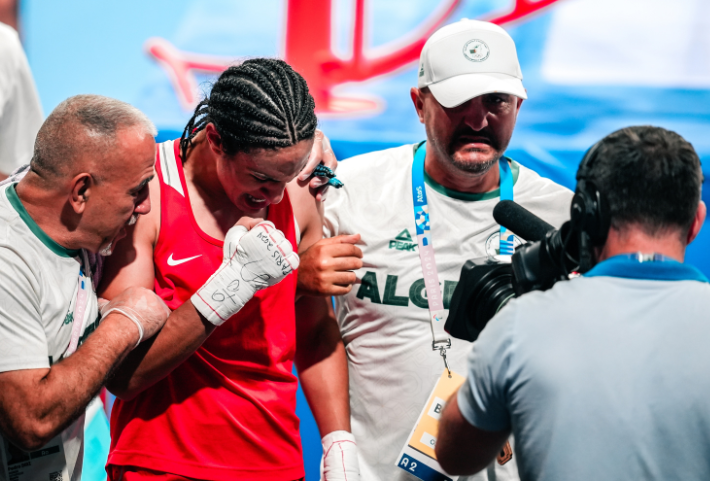It took only 46 seconds for Italian boxer Angela Carini to withdraw from her match against Algerian Imane Khelif. Carini, who won silver medals at both the World and European Championships in 2019 and was competing in her second Olympics, left the ring without shaking hands with her rival.
“I am heartbroken,” she said after the match at the Paris Olympics. “I stopped because I felt a sharp pain in my nose […] The second punch I felt on my nose was very strong, and I realised that either I stopped or I could hurt myself for real.”

Pressed during the post-match interview to say if there were any other reasons why she left the ring, Carini explained that the problem was not who she was fighting but the pain she felt.
A photo of Angela Carini in tears started circulating on social media, creating a massive wave of support for her and a huge backlash against Imane Khelif. Italian Prime Minister Giorgia Meloni called the match “not a fair competition,” while Deputy Prime Minister Matteo Salvini criticised those “who allowed a match that was clearly not on equal terms”.
The ‘unfair’ terms
The ‘unfair’ terms they speak of refer to the accusations against Imane Khelif around her participation in the Olympics. In March 2023, the International Boxing Association (IBA) disqualified Khelif from the IBA Women’s World Boxing Championships 2023, along with Taiwanese boxer Lin Yu-ting, who also appeared at the 2024 Summer Olympics. Rumours about the reason behind this decision started to spread, the most popular being that Khelif might have a high level of testosterone or XY chromosomes and, therefore, a Difference in Sex Development (DSD).
According to the Russian-led IBA, “following many complaints from several coaches,” the two athletes were subjected to two gender tests, and the results confirmed that they did not meet the eligibility criteria. Contradicting itself on several occasions, the Association has never clarified what kind of tests were conducted, and although it has stated that they were not allowed to disclose medical information, it has nevertheless spoken of DSD conditions and hormonal imbalances.
After the match between Imane Khelif and Angela Carini and the backlash that followed, the International Olympic Committee (IOC) defined the information about Khelif and Lin Yu-ting as “misleading” and the two athletes as “victims of a sudden and arbitrary decision by the IBA”. The IOC, which withdrew recognition of the IBA in 2023 over governance issues and allegations of corruption, also defined the tests conducted by the boxing Association as not legitimate.
Silvia Camporesi, bioethicist and Incoming Research Professor in Sports Ethics & Integrity at the KU Leuven University told Media Diversity Institute: “The IBA should have no authority in the matter since it is no longer the governing body, but the IOC has not been transparent nor proactive” and took a stand only after the discussion had started.
“The IOC should have made a statement in advance explaining that, based on their framework and the absence of scientific evidence that suggests any unfair advantage, the athletes were eligible to compete.” Instead, “the lack of transparency has damaged the athletes: it has harmed Carini because she was told she was going to compete with ‘a biological man’, and it has harmed Khelif since she cannot win because her victory might be questioned”.
The attacks on media and social media
In Italy, the backlash against Khelif started to spread before the match with Carini, which took place on 1 August. The front page of the right-wing conservative and populist newspaper La Verità on 31 July read: “An Algerian man will punch an Italian woman” and called Khelif “a trans boxer” and “a man”, as did Il Giornale the following day. On the front page of Italy’s most read newspaper Corriere della Sera on 1 August, the Algerian was called “the testosterone boxer”, while a journalist from Libero attacked “the hypocrisy of the politically correct”. Claiming to defend women’s rights, Italian politicians, journalists, and celebrities used their platforms to make transphobic and misogynistic comments and spread misinformation. The misinformation also came from experts in the field. As Camporesi said, “In Italy, there is a huge problem of expertise.” As was the case with the pandemic, even some scientists express inaccurate concepts, so the bioethicist asks: “What is left for the public?”
For years, Camporesi has been following a similar case that involved the South African runner Caster Semenya and told Media Diversity Institute: “The debate has seen an intentional conflation of the issues around trans people and people with DSD. I don’t think this is an honest mistake but rather part of a strategy to question who can be considered a woman. Attacks on these issues have also become increasingly heated: even saying that human nature and sex are not binary is considered ‘ideology’ instead of what they are, scientific evidence.”
According to the bioethicist, “The discussion can be set on what is an advantage, but we should rather ask: ‘At what point does this advantage become unfair?’ On this, science can help.”
As her research on Caster Semenya has shown, the runner didn’t have a biological advantage that couldn’t be achieved by other athletes with non-DSD, i.e. “they could beat her and therefore her advantage is not unfair and is comparable to other genetic or biological advantages.”
Khelif as well has lost matches throughout her career, including a quarter-final defeat at the Tokyo Olympics against Ireland’s Kellie Harrington, but no one talked about it. It is also no coincidence that these attacks mainly affect women who are not white, come from the Global South and don’t conform to Western femininity standards. It happened to Caster Semenya and Indian professional sprinter Dutee Chand, and it is happening now to Algerian Imane Khelif.
“Some bodies are not welcomed,” Camporesi said. In the meantime, Imane Khelif has continued to fight and asked to “refrain from bullying from all athletes” because “it can destroy people”.
